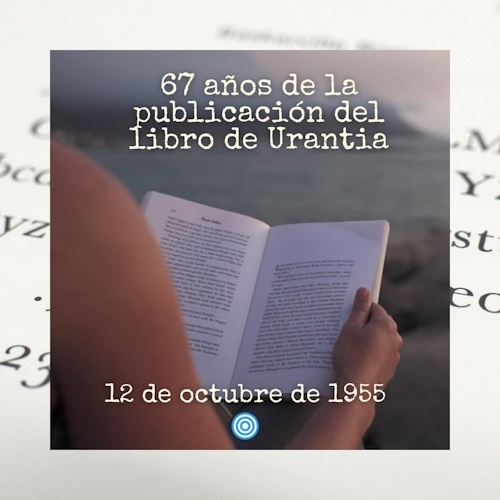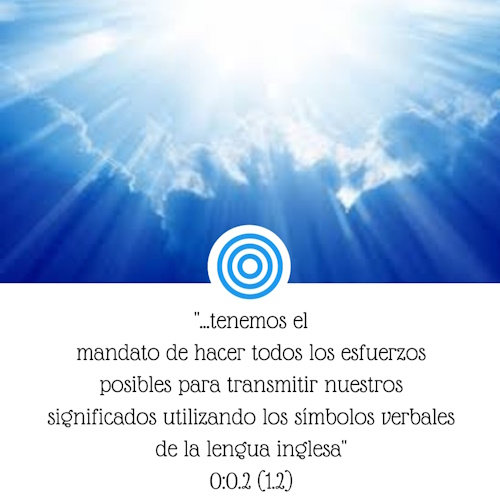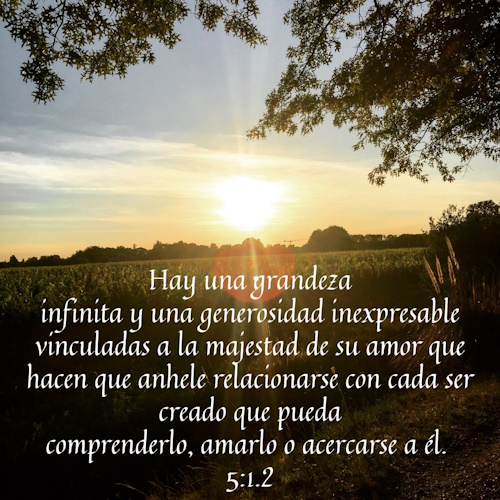© 2022 María José Sánchez Santamaría
© 2022 Urantia Association of Spain

Two angels fly over post-war Berlin, the city split in two: Damiel and Cassiell. They are invisible, except to children. They cover themselves with dark coats, they fly. They are eternal, protectors and vagabonds. They look at the reality of humans in sepia. They accompany them, they guess them, they can listen to their thoughts. They do not have the possibility to feel as humans feel and yet they are empathic angels. They share fragments of people’s lives, they caress them with their eyes, they hold them without their knowledge.
I’m talking about the moving film The sky over Berlin, directed by Wim Wenders.
Without anyone realizing it, these angels enter a library. Since humans cannot see them, the angels freely approach, sit next to humans, or place a hand on their shoulders. Intrigued, they peer into the books they are reading. They stroke a student’s pencil. Together with some children, they imitate the gesture of touching the lines with the index finger. They observe around them, with curiosity, self-absorbed faces and gazes submerged in words…
Angels have the gift of hearing people’s thoughts. No one speaks, but they catch the silent syllables of the reading. Reading builds an intimate communication, a sound solitude that angels find surprising and miraculous.
Like this sequence in the film, if we could be present in the fascinating and remote Library of Alexandria we would be in rooms full of whispers and whispers. In ancient times, when the eyes recognized the letters, the tongue pronounced them, the body followed the rhythm of the text and the foot tapped the ground to the rhythm. The writing could be heard. Few imagined that it was possible to read in any other way.
Now let’s talk about you, dear reader or reader, who reads this editorial from our magazine. Right now, reading these letters, these black-on-white scribbles on your screen, you are doing a mysterious and disturbing activity, even though the force of habit prevents you from being amazed by what you do. Think wisely. You are silent, going through these letters that communicate ideas of the world that surrounds you right now. You have withdrawn into an inner room where people far away in time or space speak to you. You have created a parallel reality similar to the cinematographic illusion, a reality that depends only on you.
But this has not always been so. From the earliest centuries of writing to the Middle Ages, reading aloud, to oneself or to others, was the norm, with writers speaking the sentences as they were written listening to their musicality. The books were not a song that was sung with the mind, as now, but a melody that was played aloud. The porticoes of the old libraries were not silent, but invaded by the voices and echoes of the pages read. Perhaps that is why the first to read as you do, in silence, in individual freedom, in silent conversation with the writer, drew attention in their time.
In the fourth century, Augustine was so intrigued to see Bishop Ambrose of Milan read in this way that he wrote it down in his Confessions. It was the first time someone had done something like that in front of him. Agustín realizes that this reader is not by his side despite his physical proximity, but is in another world, traveling without moving and without revealing where to find him.
You are, therefore, a very special type of reader. This silent dialogue between you and me, free and secret, is an amazing invention. Something that we should not let disappear, swept away by the flood of images and current digital stimuli.
This short dissertation about the importance of reading, its singularity and value, seeks to revalue the daily act that so many readers of The Urantia Book do every day, in different parts of the world and in different languages. Good alone, good in groups.
When the blue book came to light on October 12, 1955, 67 years ago, more than half a century, the revelators knew how important reading was for our progress. Since then, the fifth revelation has not ceased to be published, translated into dozens of languages, read alone, and analyzed in groups, conferences, and meetings all over the planet.
Right now, in October, we celebrate the 67th anniversary of the publication of The Urantia Book. A book that formulates at the beginning its intention to expand our worldview and spiritual development:
It is exceedingly difficult to present enlarged concepts and advanced truth, in our endeavor to expand cosmic consciousness and enhance spiritual perception, when we are restricted to the use of a circumscribed language of the realm. But our mandate admonishes us to make every effort to convey our meanings by using the word symbols of the English tongue. (UB 0:0.2)

This crucial work that the blue book formulates in its beginnings would not be possible if thousands of new, groundbreaking, expansive ideas were not fixed in a text. A text that can be reread hundreds of times, underlined, highlighted on paper. A text that, each time it is read in that silent dialogue that I alluded to before, is understood better, it is captured in greater nuances not glimpsed in the first reading.
This striking way of revealing the Deity his projects, not using people as messengers, but using an element of human technology such as books, doesn’t it call your attention? An element that allows us intimate communication between the minds of those who have prepared the different UB documents and human beings. It is amazing that this prodigious book allows this communication with stellar beings, extraterrestrials (and also with terrestrial beings not so well known as intermediate beings). A mind/mind communication that shows us that we are ALL personal beings, we are all capable of establishing communication, we are all part of a great cosmic brotherhood.
The same book highlights this divine desire for communication, this effort to be revealed with a multitude of resources:
Our Father is not in hiding; he is not in arbitrary seclusion. He has mobilized the resources of divine wisdom in a never-ending effort to reveal himself to the children of his universal domains. There is an infinite grandeur and an inexpressible generosity connected with the majesty of his love which causes him to yearn for the association of every created being who can comprehend, love, or approach him; and it is, therefore, the limitations inherent in you, inseparable from your finite personality and material existence, that determine the time and place and circumstances in which you may achieve the goal of the journey of mortal ascension and stand in the presence of the Father at the center of all things. (UB 5:1.2)
The revelators know that this unusual communication is going to be possible not only because of the material in the book but also because of the internal presence of a divine Spark. Here is the key to understanding the text:
Although the approach to the Paradise presence of the Father must await your attainment of the highest finite levels of spirit progression, you should rejoice in the recognition of the ever-present possibility of immediate communion with the bestowal spirit of the Father so intimately associated with your inner soul and your spiritualizing self. (UB 5:1.3)

The text written 67 years ago is a door that, once opened, once we go to the other side, we realize that it is an instrument that leads us to discover that the most important thing of all is LOVE. But, really, everything is a door, everything is open to reach our fundamental essence… which is love.
“That day, the Master’s sermon was reduced to a single and enigmatic sentence.”
“He just smiled wryly and said, “All I do here is sit on the bank and sell river water.”
“And he concluded his sermon.”
“The water carrier had set up his post on the river bank and thousands of people came to buy water from him. The entire success of his business depended on those people not seeing the river. When, finally, they saw, he closed the business.”
Let’s go through the door that is The Urantia Book, let’s discover with its reading what has always been there, within our reach, at hand: the river that we all have inside.